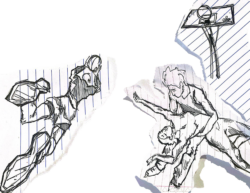When he bowed out to Novak Djokovic at the Australian Open, they attributed it to mononucleosis. When he lost to Rafael Nadal in three dismal sets at the French Open, they said he wasn’t the same anymore. When Nadal conquered him again on his own turf—the fabled lawns of Wimbledon—they said he was done. Washed up. A month ago, on the eve of the U.S. Open, Roger Federer relinquished his number one ranking to Nadal, and it looked as though the sun had set on his tennis empire.
The detractors expected him to bow out early in New York, but the King would not go down without a fight. He struggled his way through a five-set, fourth round match against Igor Andreev before dropping Djokovic in the semifinals. His opponent in the championship, surprisingly, would be the upstart Andy Murray, who beat Nadal in the other semifinal.
Murray seemed to pose a threat to Federer’s return to glory, toting a two-to-one lead in their career series and coming off the biggest win of his career at a Masters Series stop in Cincinnati. With the extra day of rest and his confidence restored, though, Federer simply wasn’t going to be upset. He dominated from the first point, repeatedly slapping forehand winners to take the opening set 6-2.
The Scotsman rebounded in the second, though, overcoming an early break before dropping the set 7-5. Sensing the moment, Federer dominated in the third set, cruising his way to a 5-0 lead. Federer’s stinging groundstrokes were on full display in the final game, and after watching Murray retrieve two of his overheads, a third attempt from the Scot fell into the net. The champion collapsed in a heap, no doubt relieved to have finally broken through in 2008, a roller-coaster season that some thought would be his ultimate undoing.
The question is, was Federer’s sublime performance in New York an indicator of things to come, or the last hurrah of a storied career? Common sense would point to the latter as a more likely outcome, because of Federer’s age (27) and the inconsistency that has plagued him all year. But great athletes know nothing of age, nor of insurmountable slumps. Tiger Woods failed to win a major in 2003 or 2004, but has won six major titles since. Michael Jordan left the game for two years before leading the Bulls to three straight NBA titles. It is hard to believe that Federer won’t follow that precedent and place himself on the same stratospheric plane as the aforementioned athletes, especially considering the form he displayed last week.
This is not to say that Federer has regained his place as the invincible champion he once was. Despite his semifinal loss, Nadal will likely remain number one for the remainder of the season, and only time will tell if Federer still has the firepower to overtake him.
This fortnight, though, belonged to Federer. After entering the U.S. Open with questions surrounding him, in the end, the story was the same: Federer wins again, this time giving him his thirteenth career Grand Slam victory. Pete Sampras’ Open Era record is fourteen, but considering the form the Swiss maestro displayed this week, it is hard to believe that number will stand for much longer.
Let Walker help you with your backhand, wjl8@georgetown.edu




